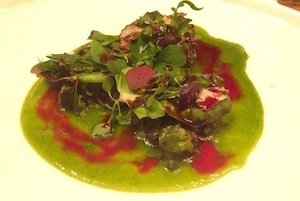It’s a known thing: for the first time, an Italian restaurant is in the World’s 50 Best’s top 3. And this must be something important if a few days ago Joan Roca, now comfortably at the top with brothers Josep and Jordi, confessed that «in the 24 hours following the voting, our website received 2 million unique visits». Two million. Who knows how many ended up clicking on Osteria Francescana’s website. What’s sure is that, on average, 150 people try to reserve each day, in Modena, though the staff can only seat 35 guests at a time.
The establishment in Via Stella was first discovered in 1995 by chef Massimo Bottura, who was joined, 5 years later, by maître and sommelier Giuseppe Palmieri from Matera. Over these 17 years the job of patron has evolved so as to have a shape of its own. And this is, perhaps, Bottura’s biggest merit, like those of all the great chefs who – paraphrasing Gualtiero Marchesi’s famous words – should they copy, they take care to conceal the source with the strength of the great creative impulse, which reduces the initial model into a distant spot.
Of course, the tortellini pasta is still handled by the invisible hand of rezdora Lidia Cristoni. In the grammar and in the process of a fondo bruno sauce there’s Georges Cogny’s orthodox rigour. The selection of faultless ingredients respects Alain Ducasse’s recommendation. In the frequent crumbling of the wall separating sweet and savoury, as well as in the impulse to cooperate with innovators from other fields, there’s Ferran Adrià’s example.

Snails under the grapevines, a dish that is a perfect summary of the origins and the destiny of Bottura’s cuisine
But then the cuisine in Via Stella acquires independence while it gradually self-generates in its narrative and travel epic. There are odysseys to waters near and far (eel, cod, oyster), techniques full of local rhetoric (
carpione, lengthy hanging), a recap of the edible cycle of animals (cow and snail), ironies that push what you believed was a priority to the back. There’s the adding of ingredients that are effective because of the fully understood value of subtraction which, however, is not always the most convenient choice. And, we believe, there’s also a greater than ever lingering on bitter and acid notes, with a work that tries to break prejudgements (first of all the semantic ones) which are still too deeply rooted, South of the Alps.
These are unique and true schemes, such as those traced by Giuseppe Palmieri’s steps, the Don Quixote of the dining room, who’s fighting as few others do to give back some dignity to a universe that is still too unpopular. After all, as Bottura himself declared on the stage of Identità «if we continue to ignore the job of waiters, in a few years time we will have an army of unemployed chefs in front of us».
At the end of the photo-gallery below, you will notice that all the staff are smiling. This is because the two leaders know how to motivate and attract them. This is the secret of the most successful teams.